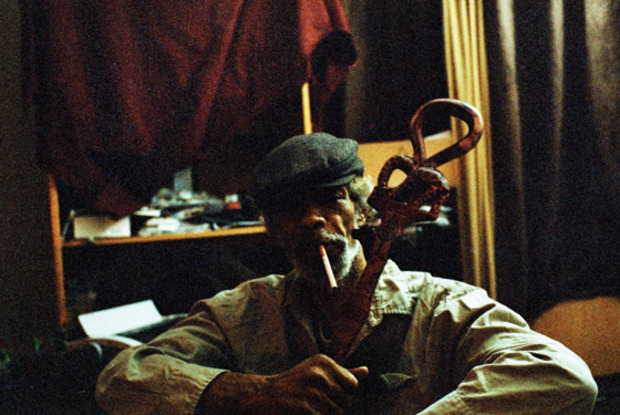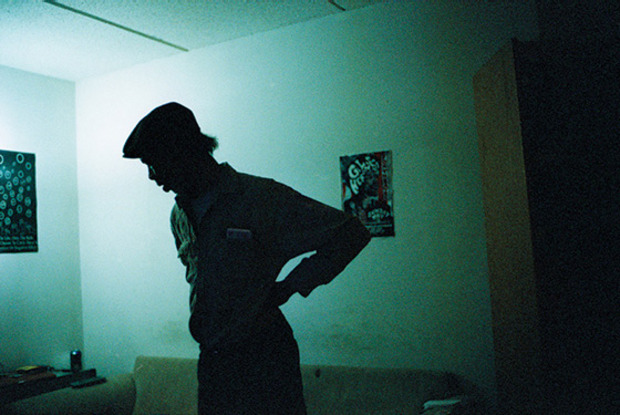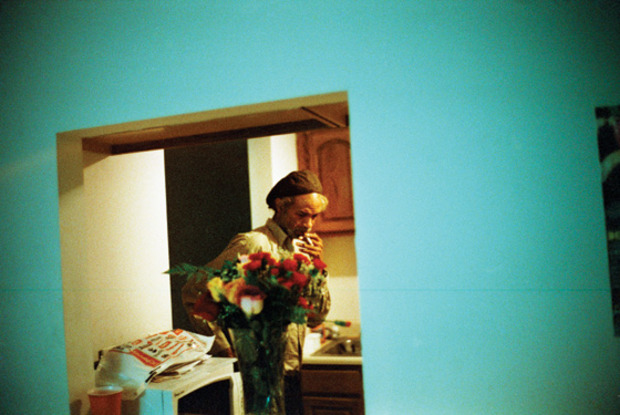It is quite possible that Gil Scott-Heron’s voice sounds so rich because he has the world’s biggest Adam’s Apple. It is giant, the size of an actual apple, shellacked with thin skin and dappled with yellow-white wayward hairs. His voice has been like this since he began his musical career in the early ’70s, with songs like “Whitey on the Moon” and “Home is Where the Hatred Is,” embodying the pains and frustrations—and pride—of being a minority in America. After moving from Chicago to Harlem, Scott-Heron made music that fluctuated between Detroit and Philadelphia soul and biting spoken word, the latter a staccato portrait of urban life that helped inspire subsequent generations to invent rap. It was indeed through this hip-hop genealogy that a British teenager named Richard Russell discovered Gil Scott-Heron in the ’80s. Years later, after initially working as a producer himself, Russell founded XL Recordings, the wildly successful avant-garde electronic and rock label home to The White Stripes and MIA, but he never forgot about Scott-Heron.
In 2006, while Scott-Heron served an extended sentence for cocaine possession and contempt of court at New York’s Riker’s Island, Russell visited him to propose a collaboration. Scott-Heron was convinced by Russell’s devotion, and the two slowly developed a true partnership, Russell the steadfast supporter at Scott-Heron’s side. “The reason for [my] tenacity is that if you’re working with someone who’s a genius, they don’t need to be that tenacious about what they’re doing. They just need to deliver it,” says Russell. “Like all the very best artists in any field, he’s a middleman. The best artists catch inspiration and they channel it in a way that people can enjoy. I don’t think Gil has ever worked that hard at it.” To ease that flow, Russell flooded Scott-Heron with production options, cover song possibilities, string loops and infinite vibes, letting him pick and choose what felt best. The resulting album, I’m New Here, is a showcase for Scott-Heron crossing genres—folk, dubstep, spoken word—with his bluesman’s croak the binding tie. It’s also a document of the relationship between the two men, who speak of each other in nebulous tones somewhere between familial and romantic. “I think in that first meeting, we looked at each other in the eye, and it felt like we were going to be able to do this somehow. I came out of there thinking, We’ll do this,” says Russell. His faith in and praise of Scott-Heron is that of a real friend, but also a true believer. “That’s the thing of being a messenger,” Russell says of Scott-Heron’s gift for channeling spirituality. “They’re delivering it, and it means something to people because it’s so real.”
Scott-Heron is more skeptical of himself, though he doesn’t discard others’ interest in him. In fact, he may need it. His office is in disarray, with bail forms and royalty statements strewn randomly across tables and a couch with cigarette burns. There’s a huge flatscreen streaked with cleaning marks, an ironic touch for the man who wrote “The Revolution Will Not Be Televised.” Scott-Heron chain smokes Marlboros through our interview. He’s wearing sweatpants, a silk robe and a T-shirt with an image of his face on it from his 1971 album, Pieces of a Man. Comfortable and loose, he talks warmly about creating I’m New Here with Russell. That deep, rich voice is now more muted than it once was, as though weathered by 40 years of protest, but Gil Scott-Heron sounds far from finished.
XL streamed the title track of your new album on its website, and my first thought when I heard it was what the hell is Gil Scott-Heron doing covering Smog?
That’s Richard.
He’s very fond of you.
We had a really good time.
It was fun?
Yeah. I wouldn’t have done it if not.
Really?
Fuck it. What are they going to do? Put me in jail?
Do you remember when Richard first wrote to you?
A lady that takes care of my things brought the letter. He was saying that he was interested in doing some recording. That wasn’t the only letter from people that were interested in doing things record-wise, but I remembered him when he talked about it, first of all because he was from the UK, and second of all because he mentioned some artists that I was familiar with, some songs I was thinking about doing.
Did you write him back?
He said he was going to be in the States and I said, “Do you want to come over? It’s a free country, they let you in no matter what.” At the time, I was doing the same thing every day. I was in jail, so I was in a small circle of moving around. So it wasn’t hard for him to find me, that’s what I’m trying to say.
What was it like when he came to see you for the first time?
I felt as though he believed it.
It must have radiated out of him.
He’s very enthusiastic. He’s very, very gung ho about doing things and has a clear picture of what he wants to do. I’m saying though, I got busted with about twenty dollars worth of cocaine. I figured I was going to do 30 days and that was what was on schedule, but the judge intervened and had to change the judgment to a felony. She recommended a program and I asked her if she’d step aside, so I had contempt of court added to what was going on. I agreed that I was in contempt and that was another charge. So things went from bad to worse and I got a year and a half.
My mother said if you can do something for somebody, why not? That wrapped it up because i couldn't find no more philosophy and no more bullshit to say about that.
How long into that did you meet Richard?
This was about six months into it. I had yet to go upstate, but I was on my way.
Richard seemed very sure of what he wanted to do.
He did, and I said to him I’ve had dreams like that. I quit school when I was 19 to write a novel. Not to publish the novel, but to finish the project. To actually sit down and complete something, because I was the one who had a thousand threads out there and they all ended up as threads that just dropped somewhere, and I wanted to wrap one up and put it on a spool and have people say, this is a complete thread here. The fact that it got published is good. But finishing it and completing the project was the idea, so I thought it was worthwhile to see what was going to happen with the Richard project.
Did you feel like you were a vessel for his project?
I had some things to say, and I could get involved in whatever fashion I wanted. I could have done really shitty jobs on things and they could have not been usable, but I wanted to do the best I could to see all the pieces come together, and they do in a different sort of way.
You had already met Richard a few times before you started recording, so was the trust level already there? What is your relationship with producers generally like?
I don’t have producers, I generally produce myself.
So what was that change like?
Well, I still liked me, and I didn’t know him.
He’s a foreign guy in many senses.
Not really. He’s a human being and we come from the same planet, so we’ve got a lot in common.
How did it feel to have someone so gung ho about making this happen?
It felt good. That’s how I feel when I’m getting ready to do something and I have some place I want to go. I’m all right, especially in a one-man race. You always know you’re going to win. It’s not a competitive thing. It’s not me against him. It’s seeing if we can work together, and of course we can because we both like music and most of the material. I’m sorry to say that we didn’t battle and fight.
It’s better that you didn’t.
It’s a more interesting story—Russell against Heron, you know? It was a good idea. In the middle of this, his wife was pregnant and he’s gotta do this, he’s gotta do that, she’s gonna murder him and I’m not that important. So things happen. Your life goes on at the same time, but overall in terms of the project, it felt good.

Tell me about the electronic songs.
I worked with Malcolm Cecil [the pioneering producer who worked heavily with early synthesizers]. Malcolm Cecil invented all those things.
But none of your songs in the past had…
Sure. “B Movie” had a six-minute fucking loop. I mean, we accept electronics and electricity. You cannot turn on the microphone or turn on the lights without it, so we’re not afraid to put in an instrument in that context.
Now that the album’s finished, how do you see it sitting with your catalog?
I’m working on something else now.
You don’t like looking backwards?
It’s in the hands of the jury to determine how much they enjoy it.
You don’t think that’s the easy answer?
No, I think that’s the truth. I wish that everybody would buy it. I’m saying, if I sell a million records in New York, there’s still eight million New Yorkers that didn’t buy it, so is that a success or a loss? After you have 25 or 30 albums like I have out, you realize that, but there are no losses, there are no failures.
Where do ideas come from? They come from the spirits. You are not as much of your own person as you would like to claim.So you’re just waiting for it to disseminate as much as possible?
You’re not waiting. You’re doing something. Waiting is saying, “I’ll get in when everybody else gets in,” and you cancel because not everybody’s going to do it. That’s an excuse. You could have done it, you could have helped somebody, but you didn’t. My mother said, if you can do something for somebody, why not? That wrapped it up because I couldn’t find no more philosophy and no more bullshit to say about that. If I could help somebody, why wouldn’t I?
Are there times that you haven’t?
There are times that I could have been a better person. That’s why you keep on working on it.
Is that your philosophy at this point?
If we meet somebody who has never made a mistake, let’s help them start a religion. Until then, we’re just going to meet other humans and help to make each other better.
How does that translate into making songs? Do you feel like you’re actively waiting for inspiration to come through you?
No.
Then how do your songs materialize?
The spirit should be material. It’s your blood. Inside your bloodstream is your parents and their parents and their parents and their parents and they want you to make it, because when you do what you do and you’re successful, then they’re happy you made it. You’re their link with immortality.
That’s a big responsibility.
Be that and understand that. Where do ideas come from? They come from the spirits. You are not as much of your own person as you would like to claim. You are independently free to act or not act, but you’re not independently free to get ideas and be inspired. Those come from somewhere else, and you’re pleased with them because you want to feel that kind of energy that you have when you get a good idea. But you’re not sitting around waiting for it, you’re working on the other ones you fucked up. I like Richard because Richard likes Richard. He’s happy with what he’s doing. You meet unhappy people and you get the blues. You meet Richard and you get on the lighter side.
Do you feel the same way about yourself?
Certain days. On certain days, like when you didn’t finish what you were supposed to do yesterday, you feel bad. Something that I involved other people in, that I wasted their time, a piece of their life.
That’s a very selfless way to live.
I think that goes along with it. That you work with what you came with. That you add your sense of humor. That has become my most valuable sense.
Really?
If you’re not enjoying yourself, who will?
A lot of what you’ve done has been humorous, but I don’t look at this record like…
A barrel of laughs?
No. Part of the reason is because it doesn’t sound like it should be.
But that’s part of the deadpan. The joke is that I said it with a straight face, and you came up with the fact that it wasn’t that way. You tell people jokes, and you’re laughing so hard that you can’t get to the punch line. It whacks out the joke. Some people are sitting there waiting for jokes, and that’s how you collapse a soufflé. It was supposed to rise. When things come to me that are humorous and funny, I’m right on that because I like to laugh.
I have to remember I'm nothing special.
XL isn’t a label that necessarily releases Gil Scott-Heron.
When I did the first record, it was on Arista Records and they didn’t have any reputation at all. Nobody had ever heard of it. Flying Dutchman, people still haven’t heard of it.
Do you feel like you’re in good company?
I feel like I’m a friend of Richard’s. Richard is not going to let anything bad happen to me.
Not if he can do anything about it. That is certainly clear.
He can. That’s who you sign with. You don’t sign with a label, you sign with a person. I signed with Richard. Richard said that you said you can’t complain because no one’s going to want to listen to you. Ain’t nobody going to want to listen. You don’t want to talk about it, they don’t want listen, what the fuck are you going to do?
It’s a rare attitude to come across.
I have to remember I’m nothing special. I have earned the potential to be the way I want be, and it’s nothing to hide. I got no things to live up or down to. The thought of Richard just makes me smile because I had a good time with him—most of the time. We’ve been on opposite sides of different things, but we worked that out. I wanted this, he wanted that, we got somewhere in there. It’s on the record.
Both of you are very blessed to have met each other.
We were. And you take advantage of your blessings, or you kick them down the street and see if you get another one. Most of the time you cannot get one again. You come to understand, like in America, we’re capitalist, so you look at it as an opportunity, but I look at it as a blessing.
Are you going to work with him again?
I think so.
Regardless, are you going to make more music?
I’m going to see what we’re going to do. I used to have this crystal ball, but I broke it.





